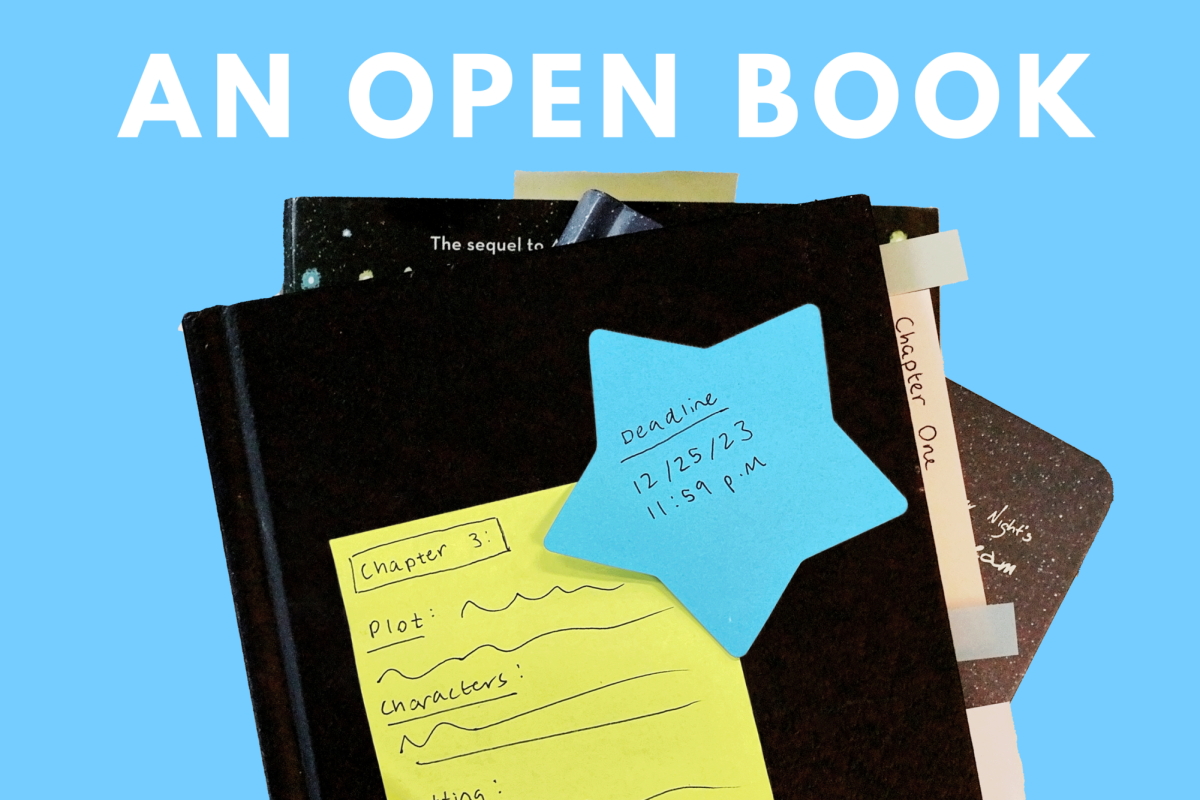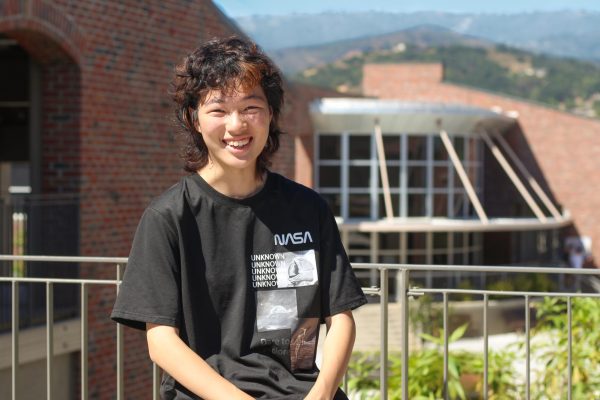One evening during her senior year, Tufts University freshman and MVHS ‘23 alum Tvisha Gupta’s mom informed her that there was a package at the door for her. Gupta’s anticipation spiked as she sprinted to the door, grappling the box with eager hands. She quickly grabbed a knife and sliced the box open, revealing stacks of dreams neatly bound as books. As she gazed at the novel she had spent three years writing, a flood of joy hit her.
“I honestly got a little emotional,” Gupta said. “I have been wanting to publish a book since I was 6 years old, and seeing it in front of me, I was like, my 6-year-old self that used to draft stories on her mom’s super, super old Sony Netbook would be so happy right now. She would be so proud right now. It was a surreal experience.”
Gupta’s contemporary fiction novel, “Alone, but Not Lonely,” was inspired by the struggles she faced after moving from India in sixth grade. The novel reflects on coming to terms with the fear of loneliness, and the main character, Sanah, mirrors Gupta’s journey in building genuine friendships.
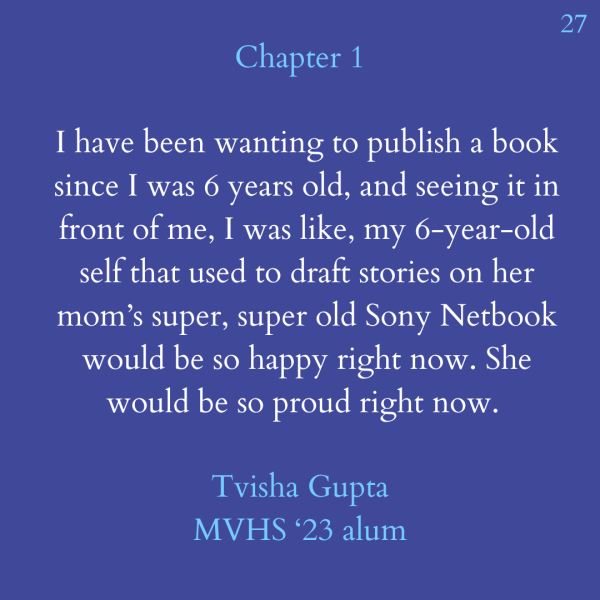
“When I moved from India, I went through a lot of the same internal battles as Sanah,” Gupta said. “I was constantly looking for people to surround myself with and I didn’t always prioritize the kind of people that I was surrounding myself with, which led to a lot of personal struggles of feeling unable to properly integrate into communities here.”
In contrast to Gupta’s novel, senior Samhita Kashyap Kiran’s first book was a poetry anthology titled “The Letters of High School.” The anthology is a collection of 26 poems, each titled a word starting with a different letter of the alphabet, that Kashyap Kiran says “juxtapose high school events with historical and current social justice events.”
While writing her book, Kashyap Kiran discovered that she could only write after midnight, often poring over her poems until as late as 2 a.m. She explains that this stipulation is psychological, as she feels more pressure from the presence of those around her to make her writing perfect during the day.
“Writing, or poetry in general, is like scraping every emotion that you hide inside you and then putting it out there in a format where everybody who looks at that page can comprehend what you’re going through,” Kashyap Kiran said. “It’s making up your mind to be vulnerable in that moment. If you’re writing a book, especially an anthology, you’re agreeing to let the public know what’s going on in your head.”
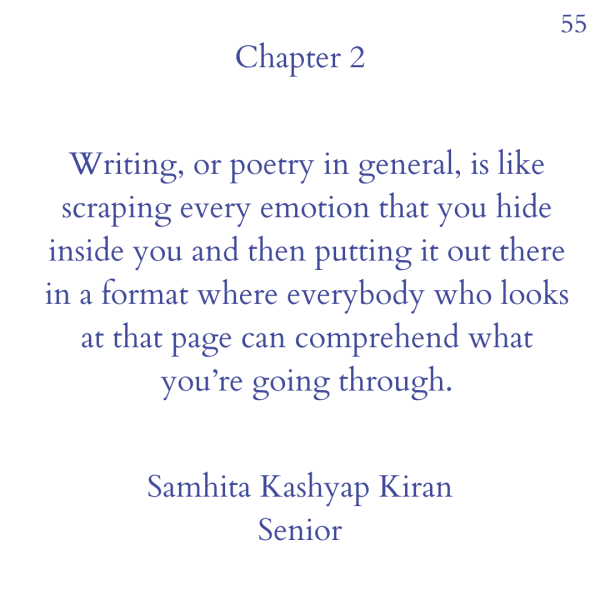
Junior Hailey Chen prefers to write prose, an interest that began with reading fiction throughout her childhood and has so far culminated in three novels. Her procedure for writing a novel begins with a concise tagline pitch; according to Chen, one of the most difficult steps is condensing the plot down to a single sentence. Afterwards, Chen creates separate Google Docs for prospective chapters, often writing spontaneously to put her ideas down.
“I have been mainly writing in small bursts during breaks or during the weekends,” Chen said. “I try not to write unless I know that I can actually crank something out that’ll be worthwhile. But I try to keep my school life and writing life as different as possible because I want to maximize my output.”
Like Kashyap Kiran, Chen reflects on real-world issues like academic pressure in her writing, with her characters embodying these issues. Similarly, many of Gupta’s characters in “Alone, but Not Lonely” were based on people in her life, which she says allowed her to infuse more emotion into her novel. Nearing the end of the publishing process was a bittersweet milestone for Gupta, as she had to say goodbye to the characters she had grown to love.
“They aren’t just fictional people on the paper,” Gupta said. “They become real people in your mind because you’ve worked with them so much. You’ve developed them, you’ve given them real human tendencies and they reflect so much of what’s going on in your own life, that you feel like they are people that you can get comfortable with. It just feels like they’re your buddies.”
When it comes to outlining, Gupta doesn’t always make concrete plans for her plot; she often lays out her chapters by braindumping on a sticky note. Likewise, Kashyap Kiran’s experience compiling her anthology was largely subconscious, with the alphabetic titling being a fluid process that often followed the actual writing of each poem.
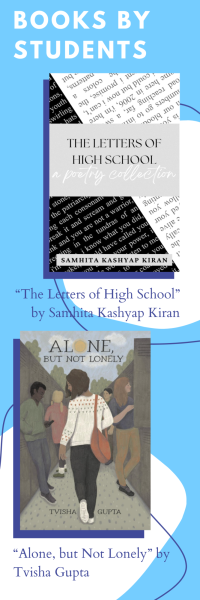
“I made a choice in the beginning that I was going to write 26 poems,” Kashyap Kiran said. “As you write poems, you realize that certain emotions overlap, and you have to make each poem distinct so that you aren’t repeating the same stuff 1,000 times. It was creating that distinction — finding a new emotion, and really channeling that into my writing — that was hard to do.”
After reaching 26 poems, Kashyap Kiran wrote each title on a post-it note and rearranged them on her floor in hopes of finding a pattern. She realized many of them
fell into niches, like struggles with identity and erasure in history, and as a result, she decided to organize her anthology into seven parts with sections of prose in between.
In terms of publishing, Kashyap Kiran explains that authors often take one of two pathways: the self-publishing route through Amazon, or the traditional route, in which writers query literary agents to help handle the process. Kashyap Kiran chose to publish “The Letters of High School” on Amazon, which she notes is a temporary measure as she continues to search for a representative for her work. She has sold 20 copies of the book so far.
“When the literary agents do respond, they’re very direct,” Kashyap Kiran said. “They aren’t rude. They’re just direct. At those times, [I feel like] maybe I shouldn’t be publishing. Maybe I’m not good enough. But then I realized that the same way I can’t write a novel, but I can write poetry, a literary agent can’t represent a poetry book if they’re good at representing novels. A ‘no’ isn’t a reflection of who you are or of how well you’ve written something.”
During the publishing process, Gupta faced another challenge when some of her writing got turned down by her editor. Gupta had written two chapters introducing two new characters, but her editor advised her to delete that section of writing. This was a difficult decision for Gupta, as she already formed a connection with the new characters she had created.
“Having to depart with some of the characters is like a knife in the heart sometimes, but it needs to be done,” Gupta said. “One of the things that the publishing process really teaches you about is that sometimes you have to accept these decisions, even though they suck because even though she asked me to remove the characters like yeah, I now see why she did.”
Rather than publish her novels, Chen submitted two to the Scholastic Art and Writing Awards, winning a silver key. She acknowledges the pressure that exists for writers to publish their work, citing how books on writing tend to include a segment about publishing. However, Chen feels that she may not be a mature enough writer to publish yet; instead, she enjoys writing because she has the time and ideas to herself, enabling her to express her thoughts.

“One of the challenges I struggled with was first thinking that I had to be published and thinking that this book had to be perfect in the public eye,” Chen said. “But later on I realized you write for yourself, and that doesn’t have to be your goal, to be published.”
Ultimately, writing serves as both an outlet of expression and a tool for advocacy for Kashyap Kiran. While she wrote “The Letters of High School” in part to call attention to social justice issues around the world, she says writing is also how she puts herself out there for others to understand at a different level, a sentiment shared by Gupta and Chen.
“I really believe that my words have power in some sense,” Kashyap Kiran said. “My speech coach would always tell me that your words are a gift. If I have the capability and the interest of writing, then I might as well do it because I can spread awareness on things I’ve heard — especially in a place like Cupertino where we’re inside a bubble — that we really need to hear. I felt like writing was my way of explaining myself, and just me trying to become more of a real person.”


